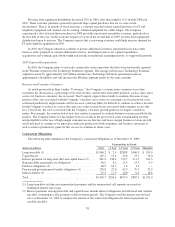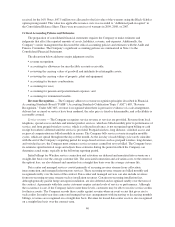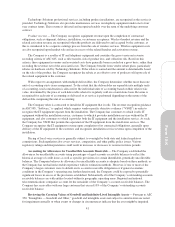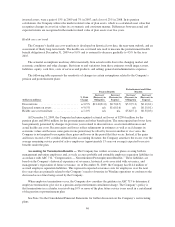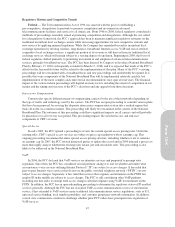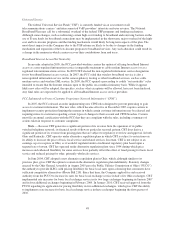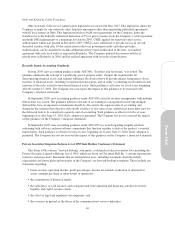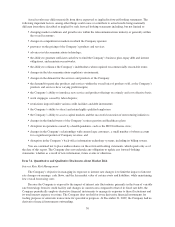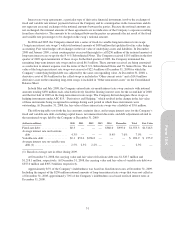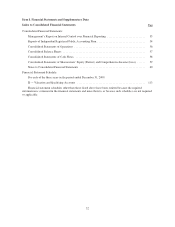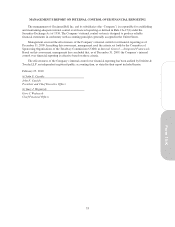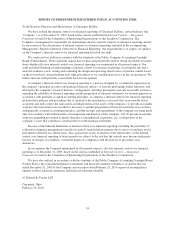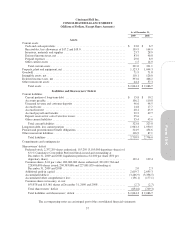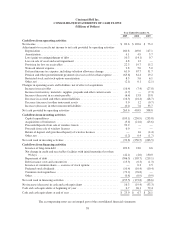Cincinnati Bell 2009 Annual Report Download - page 118
Download and view the complete annual report
Please find page 118 of the 2009 Cincinnati Bell annual report below. You can navigate through the pages in the report by either clicking on the pages listed below, or by using the keyword search tool below to find specific information within the annual report.Universal Service
The federal Universal Service Fund (“USF”) is currently funded via an assessment on all
telecommunications carriers’ and interconnected VoIP providers’ interstate end-user revenue. The National
Broadband Plan may call for a substantial overhaul of the federal USF programs and funding mechanism.
Although some changes, such as redirecting certain high-cost funding to broadband and removing barriers on the
use of E-rate funds for broadband connections may be implemented in the short term, major overhaul of the high-
cost and low-income programs and the funding mechanism would likely be long-term aspects of the plan. The
most direct impacts on the Company due to the USF reform are likely to be due to changes in the funding
mechanism and expansion of the low-income program to broadband services. Any such alteration could result in
a change in the manner in which carriers recover their contributions from end users.
Broadband Internet Access/Net Neutrality
In an order adopted in 2005, the FCC provided wireline carriers the option of offering broadband Internet
access as a non-regulated information service (comparable treatment to cable modem Internet access) or as a
regulated telecommunications service. In 2007 CBT elected the non-regulated information service designation
for its broadband Internet access service. In 2007, the FCC ruled that wireless broadband service is also a
non-regulated information service on the same regulatory footing as other broadband services, such as cable
modem service and wireline DSL service. In 2009, the FCC opened a proceeding to codify “net neutrality” rules
intended to ensure that the Internet remains open to the public on a nondiscriminatory basis. While it appears
likely new rules will be adopted, the specifics, such as what exceptions will be allowed, have not been finalized.
Any final rules are expected to be applied to all broadband Internet access service providers.
FCC Safeguards to Protect Customer Proprietary Network Information (“CPNI”)
In 2007, the FCC released an order implementing new CPNI rules designed to prevent pretexting to gain
access to customer information. The new rules, which became effective in December 2007, require carriers to
implement security protections limiting the manner in which certain customer information may be released and
requiring notice to customers regarding certain types of changes to their account and CPNI breaches. Carriers
must file an annual certification with the FCC that they are compliant with the rules, including a summary of
actions taken in response to customer complaints.
State — Because CBT generates a significant portion of its revenue from the operation of its public
switched telephone network, its financial results follow no particular seasonal pattern. CBT does derive a
significant portion of its revenue from pricing plans that are subject to regulatory overview and approval. In both
Ohio and Kentucky, CBT operates under alternative regulation plans in which CBT is subject to restrictions on
its ability to increase the price of basic local service and related services. In return, CBT is not subject to an
earnings cap or recapture in Ohio, as it would if regulated under a traditional regulatory plan based upon a
targeted rate of return. CBT has operated under alternative regulation plans since 1994 during which price
increases and enhanced flexibility for some services have partially offset the effect of fixed pricing for basic local
service and reduced pricing for other, primarily wholesale services.
In June 2004, CBT adopted a new alternative regulation plan in Ohio, which, although similar to its
previous plan, gives CBT the option to remain in the alternative regulation plan indefinitely. Statutory changes
enacted by the Ohio General Assembly in August 2005 gave the Public Utilities Commission of Ohio (“PUCO”)
the authority to provide ILECs with pricing flexibility for basic local rates upon a showing that consumers have
sufficient competitive alternatives (House Bill 218). Since that time, the Company applied for and received
authority from the PUCO to increase its rates for basic local exchange service in half of its Ohio exchanges. CBT
implemented rate increases for basic local exchange service in its two large exchanges beginning in January 2007
and in four additional exchanges beginning in February 2009. In January 2010, CBT received approval from the
PUCO regarding its application for pricing flexibility in two additional exchanges, which gives CBT the ability
to implement a rate increase for basic local exchange service in these exchanges beginning the first quarter of
2010.
48


